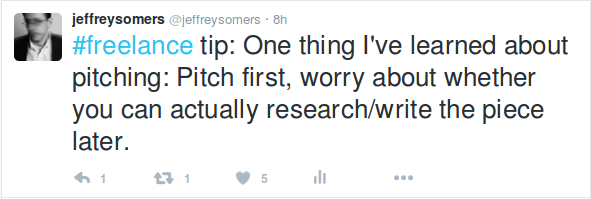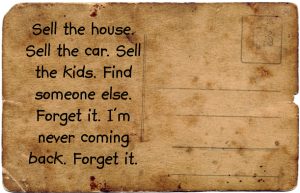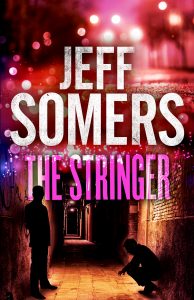St. Paddy’s Day
This was originally written in 1998, and appeared in The Inner Swine Volume 4, Issue 2. This might be funnier if you know who Carolyn and Mandy really are. Or not.

The only massacred was my pride.
BIG-HATTED WOMAN, WHERE HAVE YOU BEEN ALL MY LIFE?
A Day in the Life of Your Editor: The Saint Patrick’s Day Parade in Hoboken, New Jersey
Back in March I was invited to the home town of two of my lovely assistants, known here as Mandy Cuervo and Carolyn Millivanilli in order to protect their reputations, to watch a lame parade and then drink all day. What follows is a report on our activities. It is my hope that this will help others who are victims of the “Big Hats” at these parades; my therapy is ongoing.
TIME-LINE OF THE BIG HATS
11:30am: I arrive. Mandy, is frying bacon naked in the kitchen. Carolyn had already consumed an entire bottle of champagne and is passed out on the floor. I step over her gently.
12:00 noon: The sound of the Clancy Brothers on the stereo awakens Carolyn, who immediately begins a painful, off?key wailing I quickly identify as singing. Mandy has put on overalls. I sneak into Carolyn’s room to phone Ken West desperately, promising him 50 dollars if he will join us.
12:30 pm: After consuming six pounds of bacon and two Mimosas each, I am experiencing heart palpitations, Carolyn is once again unconscious and Mandy threatens to disrobe again to attend the parade “alfresco.” I bundle the women out the door and we march up to Washington Street, which shows absolutely no signs of a parade occurring there this day.
1:00pm: We meet friends and friends-of-friends at Sullivan’s bar for a drink. The friends-of-friends are snooty, and Mandy tearfully threatens everyone in the bar with serial nudity unless they are nice to her. Carolyn quickly attracts a crowd of men, and dances for them.
1:05pm: Having been politely asked to leave by the Bar’s management, we strike boldly out to find a good viewing place for the parade.
1:06pm: distracted by a bar called Mile Square, we enter to bolster our resolve with a pint and the women don attractive, humongous, bright green hats which are just slightly larger than the women themselves. Carolyn gathers a crowd of drunken men around her and allows them to place things in her hat. Mandy pretends she has “lost” her socks, a foreboding warning of things to come.
1:30pm: while the women hoot and flash the bagpipers marching by, I notice police forming a line around us and closing in, so I begin backing away slowly. Ken West arrives and attacks us with Silly String. Mandy is delighted and claims his silly string has “ruined” her T?shirt, and happily removes it. We decide to move on and have to extricate Carolyn from a large crowd of police, who are clapping their hands and hollering as she dances for them.
2:00pm: We arrive at a bar called Hennesey’s, where Carolyn immediately finds a group of men to surround herself with. Ken, Mandy and I have drinks at the bar. Mandy’s hat keeps overbalancing her, and she eventually finishes our visit there sitting on the floor, drinking anything handed to her. When we leave to get pizza, she has mysteriously lost her brassiere.
3:00pm: At a bar called Willie McBrides, a large crowd of men are waiting for us, applauding Carolyn and holding banners that read “CAROLYN MILLIVANILLI WE LOVE YOU”. We enter the bar with great difficulty due to dangerous crowding. Carolyn holds court by the bar in the back while Mandy and I are nauseated by a “dirty” dancing couple next to us. Ken arrives in the nick of time to demand we leave immediately. We must resort to force to remove Carolyn from her admirers, and in the scuffle, Mandy loses her overalls.
5:00pm: We are at The Quiet Woman after several other bars, aware of the disturbances the women have been causing, refuse to admit us. At The Quiet Woman Carolyn quickly assembles a small group of men to entertain her. Ken and I talk baseball in a quiet corner. Mandy is now wearing her large hat around herself, as clothing. She keeps bugging Ken and I to dance with her, but we refuse, knowing that this is just a ruse so she can “lose” her underwear as well.
5:10pm: Mandy has “lost” her underwear anyway, and Ken boogies with her, defeated.
10:00pm: I find myself walking along Park Avenue towards Moran’s; I have no idea where the past five hours have gone. Mandy is nude except for the huge hat she is wearing on her head. Ken has the grim look of a concentration?camp survivor. I smell like Minestrone and vaguely remember the women dancing on the bar to the tune of “Mexican Radio.” A large mob of men follows us at a safe distance, watching to see where Carolyn goes next.
10:15pm: At Moran’s Tavern, Carolyn’s arrival causes a riot. We drink Baileys and Ken and I get separated from the women as a huge wave of men enters to surround Carolyn. I claim to be Mandy’s brother.
2:00am: We leave Moran’s to have pizza and leftovers at the girls’ house. Mandy reveals that she has been hiding her clothing in her hat. Ken wisely leaves, but I am too weak and am wrestled to the ground and robbed by the women, who taunt me, calling me “little man.” I am cast out into the street and my pants are removed.








 If you’ve been watching HBO’s WestWorld, then you’re probably pretty creeped out about the coming Singularity that will result in thousands of super-strong robots murdering us all in our beds.
If you’ve been watching HBO’s WestWorld, then you’re probably pretty creeped out about the coming Singularity that will result in thousands of super-strong robots murdering us all in our beds. The mysterious and ever-changing formula for riches in the writing world apparently skews heavily towards newsletter signups. How this works, exactly, is mysterious to me. So far I’ve figured this much out:
The mysterious and ever-changing formula for riches in the writing world apparently skews heavily towards newsletter signups. How this works, exactly, is mysterious to me. So far I’ve figured this much out: For example, the next newsletter will be out in November, and I’ll be giving away five super-rare print copies of the
For example, the next newsletter will be out in November, and I’ll be giving away five super-rare print copies of the